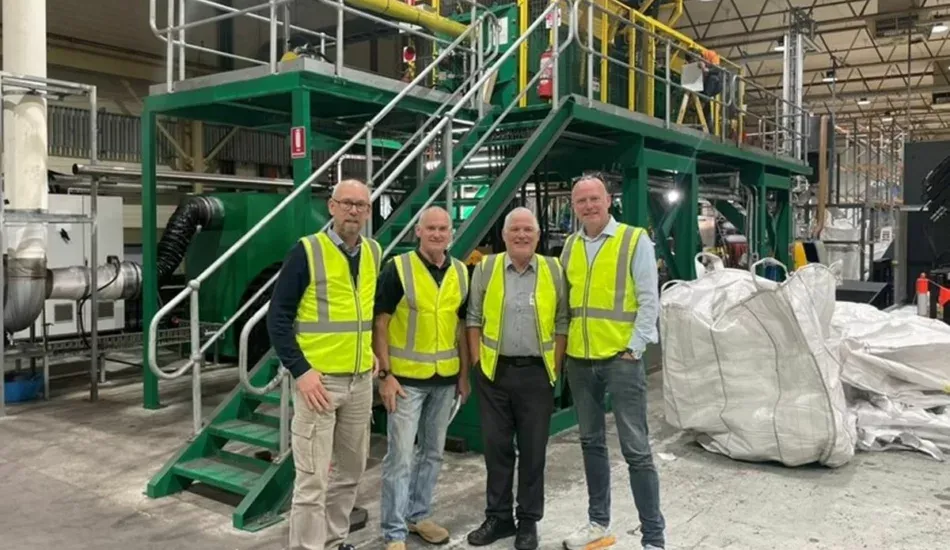Scale-up Uppact is to build a demo plant in Delfzijl that can recycle and process 4,000 tons of unsorted and unwashed plastic and textile waste annually into new plastic building and construction materials. Founder Jan Jaap Folmer and his co-founder Michel Walstock have secured the necessary €5 million in financing for this after 2.5 years.

The first line of the new plant will start up next summer. It will be built at the Chemport Innovation Center (CIC) in Farmsum. Already there is a smaller test specimen of the revolutionary recycling machine that will be used there at maritime waste collector Bek & Verburg in Eemshaven. The new machine will be three times the size. Eventually, Uppact wants to build several plants in the Netherlands and northwestern Europe.
Superhero
.The name of the machine resembles a superhero from the Marvel series: the Unwastor. The plant can recycle all types of plastic and textile waste while processing them into new materials. No matter what goes in, the Unwastor "eats everything. Whether it's mouth caps, food packaging contaminated with food particles, worn-out sneakers, discarded quilts, worn-out fishing nets or sand-contaminated agricultural plastic; it can enter the machine unsorted, unwashed and unshredded.
Poles and boards
.All those different types of plastic have different melting points, so other recyclers have to separate them first. At Uppact's facility, the textile and plastic waste is pressed against holes in a rotating drum, where it almost reaches its melting point. This creates a thick, consistent mass, which - once through the holes - can be processed very well into new materials. The machine produces new, robust plastic posts, planks and beams from the waste. These are used in construction, infrastructure or as shoring.
Less energy
.So there are emphatically no grains coming out of the machine, because you have to heat them again and that costs energy. The Unwastor uses less than half the energy compared to existing techniques. The manufactured products are also 100 percent circular. In this way, the Unwastor not only helps reduce primary resource consumption, but also CO2 emissions. So is he a bit of a superhero after all? "Yes," says CEO Folmer. "The special thing about this machine is that it can process all types of plastic into a relatively homogeneous product. That is normally very difficult."
View how Uppact's The Unwastor works here:
No competition
.How is it that Uppact is building a new plastic recycling plant, while in the Netherlands one recycling company after another fails because of imports of cheap new plastic - and even recyclate - from China and the U.S.? "Because we have much less competition with our products from those countries," Folmer explains. "Over the past year, the price for plastic posts and boards has actually increased, so we don't suffer from that downward price spiral."
Financing around
.Folmer unfolded his plans for a new plant as early as 2022. He wanted to use this new, revolutionary technology to tackle the plastic waste problem, particularly in Asia. It could also greatly increase the percentage of recycled plastic so that less waste goes into the incinerator. "It has all taken much longer than we originally thought. We had to go down the whole path," he says.
The financing is now in place. In addition to parent company Upp!, the NOM (investment and development company for the Northern Netherlands) and the Groninger Growth Fund (GGF) will also become Uppact shareholders. In addition to a grant previously obtained from the Just Transition Fund (JTF), the project will now also receive a loan from the Polestar Capital Circular Debt Fund. "This is a crucial moment. Getting funding together for such a project to build our demo plant is a big deal," said Uppact CFO Walstock.
Making an impact
.According to the new shareholders, Uppact's approach fits perfectly with both the Netherlands' and the EU's goal of promoting the circular economy and recycling and reusing plastic waste as much as possible. "We want to strengthen the region in the field of green chemistry. That's exactly what Uppact can do: recycle and also turn it into a profitable model. That's how you create the most impact,'' says Emma Schakel, investment manager of the Groninger Growth Fund. NOM also thinks the company can make an impact. "We see the potential, not only in the process, but also in the team. The past few years have already proven that what Uppact wants is possible," says investment manager Sytze Hellinga of the NOM.
Additional
.The Polestar Capital Circular Debt Fund (PCDF) has already invested €240 million in the circular economy. The fund invests in innovative circular projects that have the potential to bring change globally, both through waste reduction and recycling and by replacing fossil fuels. These types of projects have a hard time getting funding from banks and venture capitalists. "The very fact that Uppact can process plastic waste sorted out at mechanical recyclers makes the technology complementary to existing plastic recycling. In doing so, they contribute to more circularity in the plastic chain, a goal that both Uppact and we share," stated Jan-Willem König, CEO of Polestar Capital.
To Australia
.With funding in place, Folmer and Walstock were recently in Australia to inspect the Plastech Mixer-Melter - as it is called there. It was developed there by Plastech Recycling. The machine will soon be prepared for transport and will arrive in the Netherlands by ship in February. "Now we can move on, on our way to making as much impact as possible. Because that's what we're all about. That plastic should no longer go into the incinerators,'' Folmer says.
Source: Change Inc.